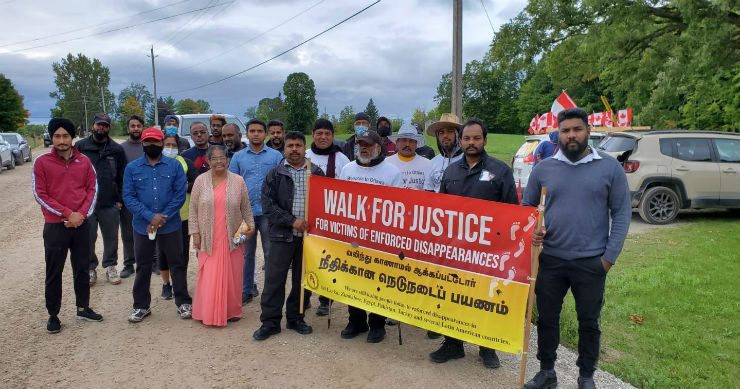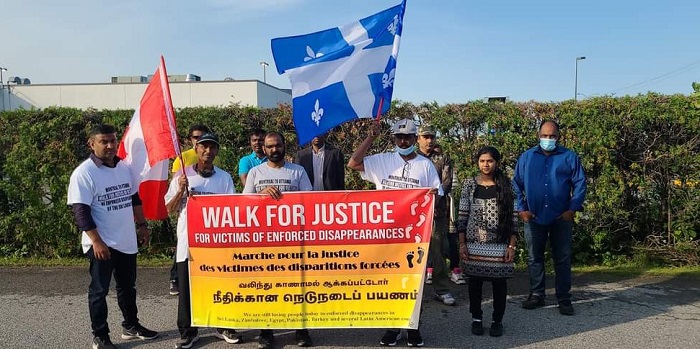 Not for nothing do the Tamil people look forward to Canada under its Prime Minister Justin Trudeau to take the lead on the international plane to seek justice for the Tamil people.
Not for nothing do the Tamil people look forward to Canada under its Prime Minister Justin Trudeau to take the lead on the international plane to seek justice for the Tamil people.
The Tamil people’s faith in Canada is exemplified by the arduous long walk for justice for the forcibly disappeared undertaken by a bunch of dedicated Canadian Tamils. The walkathon of nearly 450 kilometers from Brampton is scheduled to reach the capital city of Ottawa on the 13th of September and is to conclude with a massive rally of Tamils. The marchers are planning to submit an appeal to the Prime Minister beseeching him to mobilize the international community to realize the objective of remedial justice for the people of Tamil Eelam.
Tamils see Canada as a beacon of democracy and the rule of law with a long record of standing up for international human rights. We fondly recall how Mr. Trudeau and Canada had stood with the victims of mass atrocities in June 2019 when Canada’s House of Commons passed a unanimous motion “calling on the United Nations to establish an international, independent investigation into allegations of genocide committed against Tamils in Sri Lanka.”
Now we have encouraging news from elsewhere to fortify our faith in Canada, which has raised its voice for justice for the Rohingyas. The plight of the Rohingya people has been in many respects similar to that of the Eelam Tamils. The brutal military crackdown by Myanmar (Burma) on the Rohingya people in the year 2017 led to a mass exodus of Rohingyas into Bangladesh. The issue went to the United Nations Human Rights Council, where the Myanmar regime was hauled up for its international crimes. Myanmar was eventually referred to the International Court of Justice to be tried for the crime of genocide. The state of Gambia is already there setting the law in motion to hold Myanmar accountable over accusations of genocide against the mostly Muslim Rohingya people. The Republic of Gambia in West Africa is the smallest country in the continent of Africa, with a small population of 20 lakhs. Its initiative in seeking justice for Rohingyas is noteworthy as only states and not individuals nor non-state actors can prosecute criminal cases before the International Court of Justice (ICJ).
And now it is great news that Canada and the Netherlands have formally joined Gambia in this laudable effort. This move by Canada and Netherlands has been hailed as historic by many Human Rights organizations.
Canadian Foreign Minister Francois-Philippe Champagne and his Dutch counterpart Stef Blok have issued a joint statement to say that the two nations were intervening in the case before the International Court of Justice in order "to prevent the crime of genocide and hold those responsible to account".
Calling the lawsuit "of concern to all of humanity," Champagne and Blok said Canada and the Netherlands would "assist with the complex legal issues that are expected to arise and will pay special attention to crimes related to sexual and gender-based violence, including rape".
More than 730,000 Rohingya fled their homes in Myanmar's Rakhine state in August 2017, crossing the border into neighbouring Bangladesh where they now live in crowded refugee camps (very like the Tamil refugees in India).
Myanmar (very like Sri Lanka) says the military action was a response to attacks by Rohingya armed groups in Rakhine. But UN investigators concluded that the campaign had been executed with "genocidal intent".
The New York-based Global Center for Justice welcomed the move by Canada and the Netherlands. Akila Radhakrishnan, the group's president, said: "Just as important as their intention to intervene is their promise to focus on gendered crimes of genocide like sexual and gender-based violence, which was central to the atrocities against the Rohingya.
"Too often, gendered experiences do not translate to justice and accountability efforts and leave the primary targets of those crimes - women and girls - behind. This is an important step forward to address that gap, and Canada and the Netherlands should be applauded for this move."
Rohingya groups also welcomed the move and urged others to follow their lead. "Slowly, but surely, the net is closing in on Myanmar's leaders - they will not get away with this genocide," Tun Khin, president of the Burmese Rohingya Organisation in the UK said in a statement, describing Canada and the Netherlands as being on the right side of history.
 "It is imperative that other states, including the United Kingdom, now stand on the right of justice for the Rohingya and other ethnic and religious minorities in Myanmar," the statement added. "Justice is a core demand of all Rohingya people and particularly important for those inside the camps of Cox's Bazar who have been forced to flee their homeland and live as refugees in a foreign state."
"It is imperative that other states, including the United Kingdom, now stand on the right of justice for the Rohingya and other ethnic and religious minorities in Myanmar," the statement added. "Justice is a core demand of all Rohingya people and particularly important for those inside the camps of Cox's Bazar who have been forced to flee their homeland and live as refugees in a foreign state."
Canada and the Netherlands also urged other states to support Gambia's legal fight, which was launched in November last year on behalf of the 57-nation Organisation of Islamic Cooperation.
In the lawsuit, the small West African country said that as a signatory to the 1948 Genocide Convention it had the obligation to prevent and punish genocide, no matter where it took place.
Relying heavily on UN reports documenting killings, mass rapes and widespread arson in Rohingya villages, The Gambia alleged Myanmar was committing "an ongoing genocide" against its Rohingya minority and called for emergency measures as a preliminary step to protect the long-persecuted minority.
Myanmar's leader Aung San Suu Kyi attended the initial hearings at The Hague in December last year, calling on the 17-judge panel to dismiss the case. Rejecting the genocide claims, she warned the UN judges that allowing The Gambia's case to go ahead risked reigniting the crisis and could "undermine reconciliation".
The panel in January ordered Myanmar to take emergency measures to protect its Rohingya population, pending the fuller case.
Myanmar will now have to regularly report on its efforts to protect Rohingya from acts of genocide every six months until a final ruling is made, a process that could take years.
The entry of Canada and the Netherlands has very much strengthened the case before the ICJ and, for that matter, the demand by the Tamil people who have been victims of a genocide just as the Rohingya – the demand for Canada and like-minded states to take the lead in moving the relevant international forums for referring genocidal Sri Lanka to the ICJ.
It is truly more than symbolic that the Canadian Tamil marchers in the Long Walk for Justice for victims of enforced disappearances are holding aloft the National Flag of Canada. They are carrying a petition for Prime Minister Trudeau, seeking the support of the government and the people of Canada including the Canadian media to the worthy ideal of ending the horrendous crime of enforced disappearances and calling the perpetrators of this abhorrent practice to account.
Eelam Tamils in the homeland and in the Diaspora look up to Canada as a reliable source of support and solace. We look forward to Canada to offer continued leadership in the fight against grave breaches of international law, specifically against enforced disappearances.
We earnestly appeal to the Government of Canada to take the initiative on the international plane to put an end to the plea of state sovereignty put forward by genocidal and authoritarian states to deny accountability and justice thereby endangering international peace.
We would like to express our sense of gratitude to Canada and her people for granting asylum to lakhs of Tamils, even more than India, and treating them on an equal footing with its original citizens. We would only request Canada to add one more feather to its cap by helping the Tamils secure justice and peace.
Come on, Canada! You can make it happen.
(This article was originally published in Fortnightly Magazine 'Abel', September 11, 2020)
You can send your articles to This email address is being protected from spambots. You need JavaScript enabled to view it.

